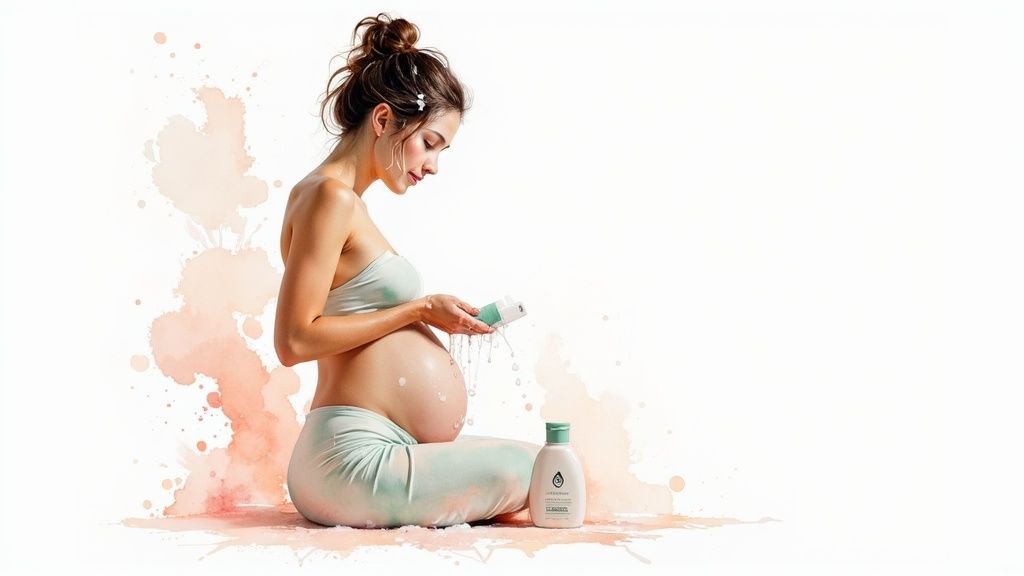
Finding the Best Pregnancy Safe Acne Face Wash
A good pregnancy-safe acne face wash is all about balance. It uses gentle but effective ingredients, like low-strength glycolic or azelaic acid, to handle breakouts without introducing any risks. During this special time, it's crucial to steer clear of harsh stuff like retinoids and high-dose salicylic acid.
Why Pregnancy Can Cause Acne Breakouts
Pregnancy is a time of incredible change, and for many, that includes surprise acne. If you're suddenly battling pimples for the first time since high school, you're definitely not alone. It's a super common side effect of the beautiful (and sometimes chaotic) hormonal shifts happening in your body.
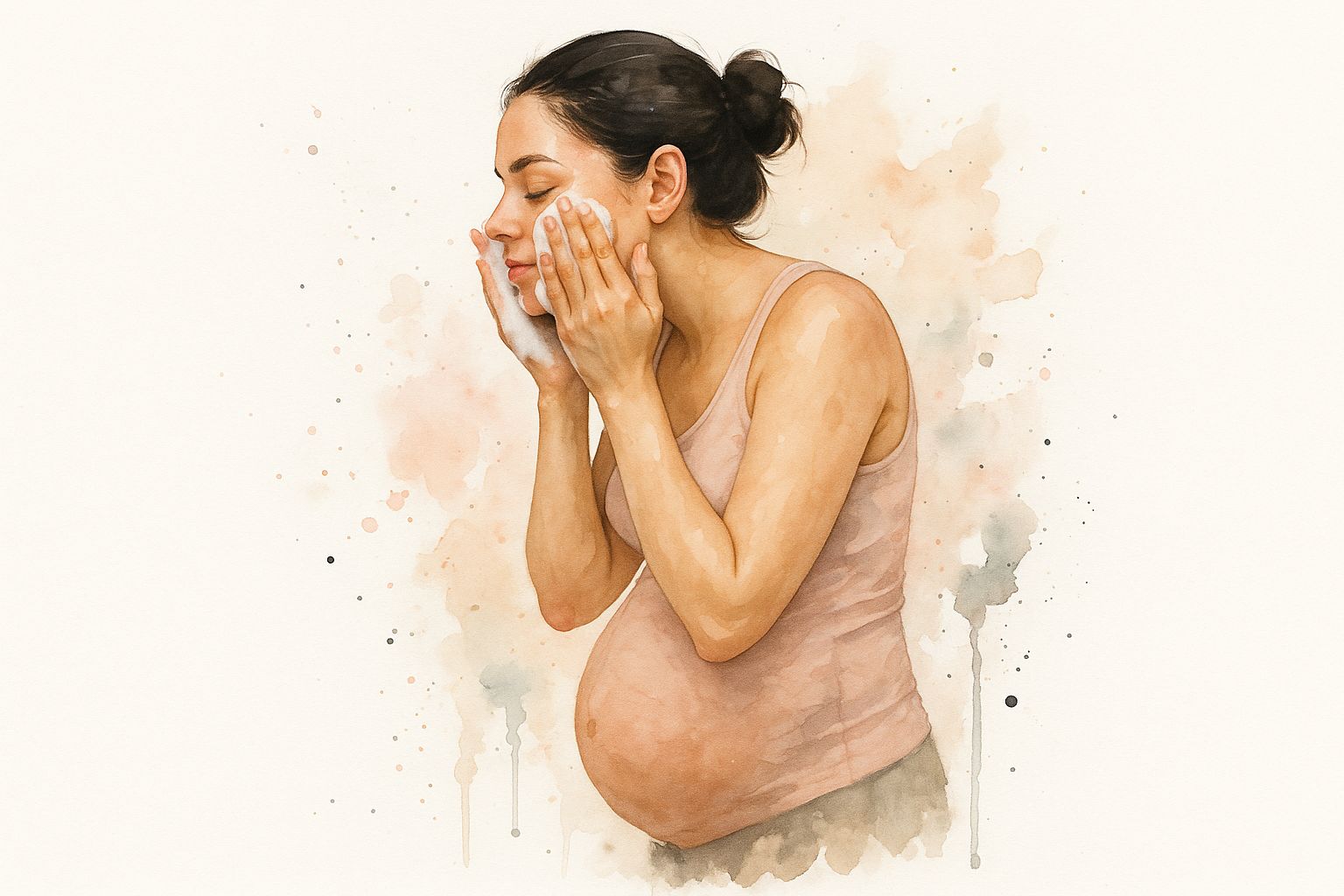
Think of your hormones like a finely tuned orchestra. When you become pregnant, certain hormones—especially androgens—get a major volume boost. This hormonal surge tells your oil glands to kick into overdrive, producing much more sebum than usual. While sebum is great for keeping skin moisturized, too much of it can easily clog pores, creating the perfect breeding ground for acne bacteria.
The Challenge with Standard Treatments
This sudden onset of breakouts can be frustrating, even more so when you discover your trusty acne treatments are now on the "do not use" list. Many common over-the-counter and prescription acne fighters contain ingredients that aren't considered safe for a developing baby. This creates a real dilemma: how do you get your skin under control without compromising safety?
This is exactly why finding a dedicated pregnancy-safe acne face wash isn't just a nice-to-have; it's a must. It's about consciously choosing a product formulated to tackle breakouts while respecting the unique needs of your body during this nine-month journey.
Acne affects nearly 85% of people between ages 12 and 24 and is a frequent complaint during pregnancy. The global acne face wash market, which includes pregnancy-safe options, was valued at USD 2.7 billion in 2024 and is projected to grow to approximately USD 4.5 billion by 2033. You can dig deeper into acne face wash market trends on verifiedmarketreports.com.
Navigating Your Skincare Journey
Dealing with hormonal acne during pregnancy simply requires a new game plan. The great news is you don't have to choose between clear skin and your baby's health. There are plenty of safe, effective solutions out there, and this guide is here to help you find them. You can learn more about how to treat hormonal acne in our detailed guide.
We’ll walk you through everything you need to know, from the ingredients to look for to the ones you absolutely must avoid. By the time you're done reading, you'll feel completely confident in building a skincare routine that supports both your skin and a healthy pregnancy.
Skincare Ingredients to Avoid During Pregnancy
Figuring out which skincare ingredients are safe during pregnancy can feel like trying to learn a whole new language. All of a sudden, your trusted, go-to products might be on the "off-limits" list. The point isn't to scare you, but to give you the knowledge to make smart, safe choices for you and your growing baby.
Think of your skin as a strong barrier, but not a completely sealed one. Tiny amounts of potent ingredients can actually make their way into your bloodstream. Normally, this isn't a big deal, but during pregnancy, even these small traces can sometimes pose a risk. The goal is simple: sidestep these ingredients without having to give up on an effective skincare routine.
This visual guide is a great starting point, breaking down common ingredients into three easy-to-understand categories: 'Safe', 'Use with Caution', and 'Avoid'. It’s perfect for a quick label check when you’re out shopping.
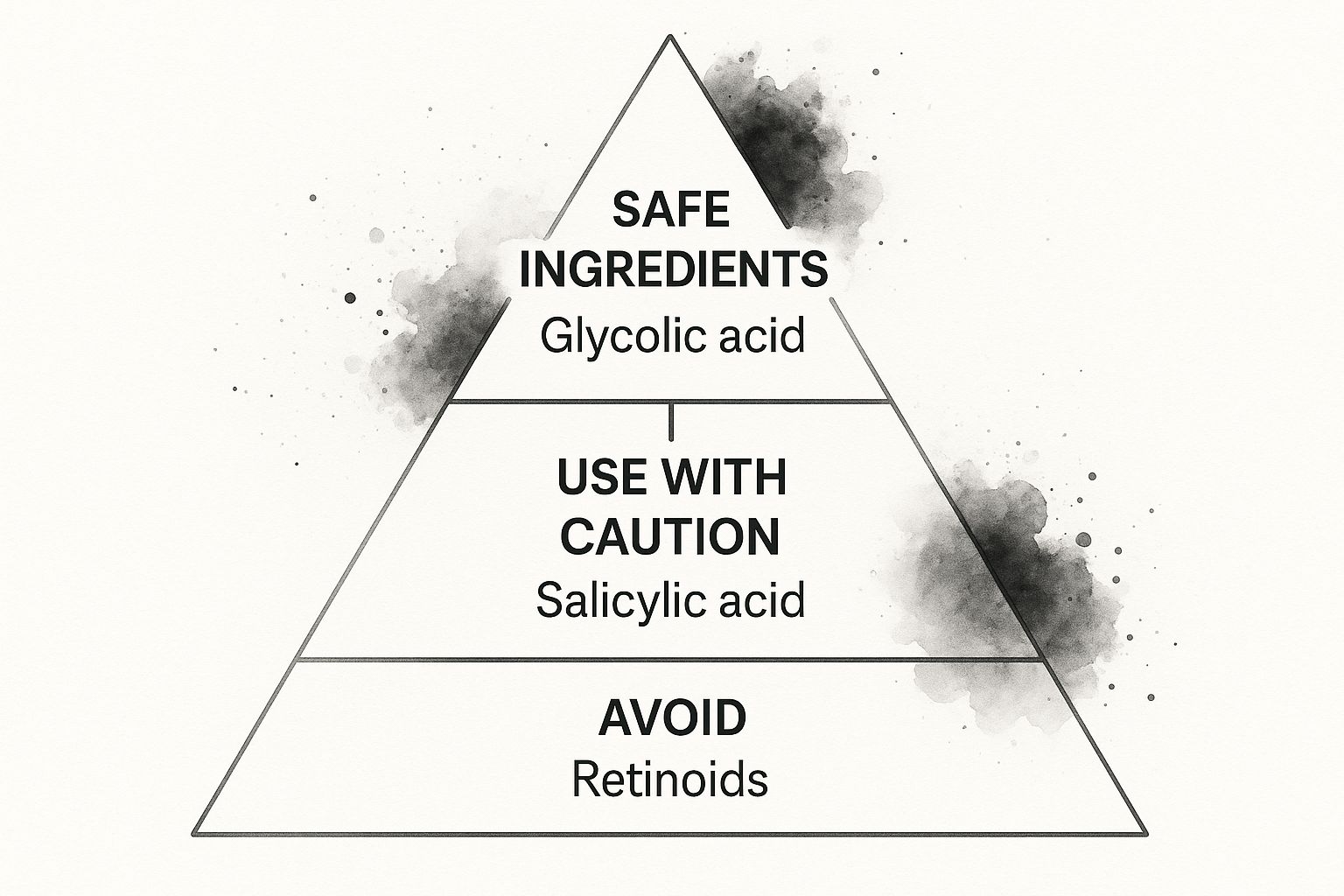
As you can see, some ingredients are a definite no-go, while others live in a bit of a gray area. This really highlights why it's so important to have a chat with your doctor before trying something new.
The Absolute No-Go List
Let's start with the hard-and-fast rules. A few ingredients have established links to developmental issues and should be avoided completely. These are the non-negotiables to watch out for when choosing any skincare, especially a pregnancy safe acne face wash.
Retinoids: This is the big one. This powerful family of Vitamin A derivatives goes by many names—Retin-A, tretinoin, retinol, retinyl palmitate, and adapalene. We know from studies that high doses of oral Vitamin A can cause birth defects. While the amount absorbed from creams is much, much lower, experts across the board agree it’s best to avoid them entirely just to be safe.
Hydroquinone: Often found in products for hyperpigmentation and melasma (the "mask of pregnancy"), this skin-lightening agent has a surprisingly high absorption rate. Because of this, it's recommended to steer clear during both pregnancy and breastfeeding.
High-Dose Salicylic Acid: This one can be a little confusing. The low-dose salicylic acid (under 2%) you find in most over-the-counter face washes is generally considered safe. However, high-concentration chemical peels and professional treatments are a different story and should be avoided. Stick to gentle cleansers and always double-check the percentage.
Ingredients to Use With Caution
Some ingredients aren't strictly off-limits, but they do warrant a conversation with your healthcare provider. Your doctor knows your health history and can give you personalized advice based on the specific product you’re considering.
Skincare during this special time is all about becoming a confident label reader. Knowing what to avoid is the first real step toward building a routine that keeps your skin happy without introducing any unnecessary risks. For a deeper dive, check out our complete guide to safe skincare during pregnancy.
Benzoyl Peroxide is a very common acne fighter. It's generally seen as safe in lower concentrations (usually 5% or less), but it’s still a smart move to get your OB-GYN's blessing first. Only a tiny amount gets absorbed by the body, but it's always better to err on the side of caution.
Another group to be mindful of is certain essential oils. While many are perfectly fine, some are quite potent and can be irritating, or their effects simply haven't been studied in pregnant women. Sometimes, the easiest path is to just opt for fragrance-free products and skip the guesswork.
Reading Labels Like a Pro
To help you quickly scan ingredient lists, here's a handy table of the major players to avoid. You don’t need to be a chemist—just keep an eye out for these names.
Quick Guide to Ingredients to Avoid While Pregnant
| Ingredient Category | Common Names on Labels | Reason for Concern |
|---|---|---|
| Retinoids | Retinol, Tretinoin, Adapalene, Retinyl Palmitate | High doses have been linked to potential birth defects. |
| Skin Lighteners | Hydroquinone | Has a high absorption rate, and its effects are not fully known. |
| High-Dose BHA | Salicylic Acid (in peels, not low-dose wash) | High concentrations may pose a theoretical risk. |
| Some Sunscreens | Oxybenzone | Controversial for potential hormone disruption; mineral options are safer. |
At the end of the day, finding the right pregnancy safe acne face wash is all about keeping things simple and safe. If you ever feel unsure about a product or an ingredient, the best thing you can do is ask your doctor or a dermatologist. They’ll help you create a routine that tackles breakouts and gives you total peace of mind.
Safe and Effective Ingredients for Pregnancy Acne
Alright, now that we’ve covered what to avoid, let’s get to the good stuff—all the fantastic, effective ingredients that are perfectly safe to use when you're expecting. Think of this as your new, pregnancy-approved skincare arsenal. You absolutely don't have to put up with breakouts for nine months; it’s just about making a few smart swaps in your routine.
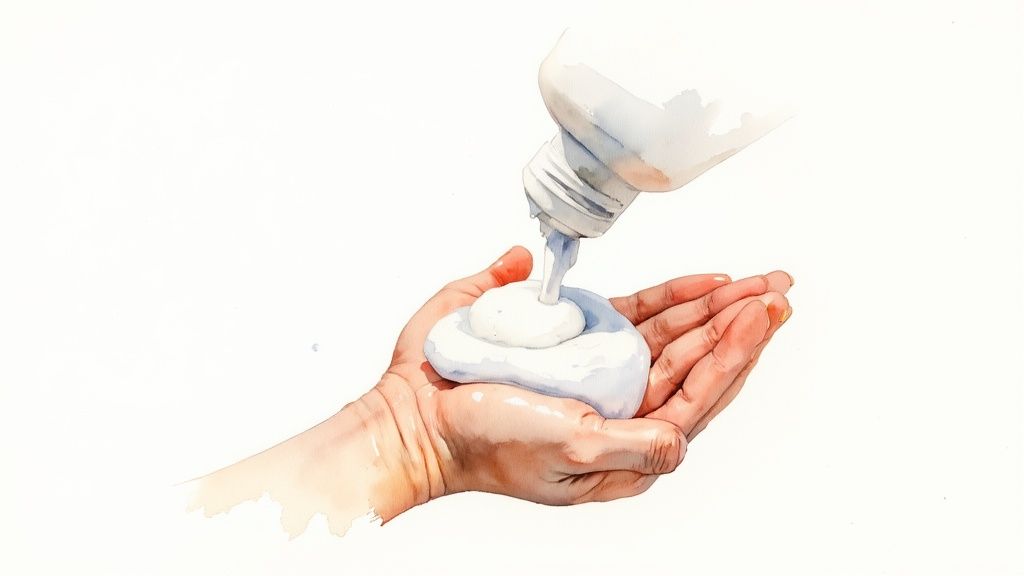
Many of these ingredients work wonders by gently exfoliating, calming down that angry inflammation, or getting a handle on excess oil—the trifecta of pregnancy acne triggers. Finding the right pregnancy safe acne face wash is all about spotting these heroes on the ingredient list.
Gentle Acids for a Brighter Complexion
While some of the heavy-hitting acids are off-limits for now, others get a big thumbs-up for use during pregnancy. A great example is Alpha Hydroxy Acids (AHAs). These work right on the skin's surface, dissolving the bonds holding dead skin cells together, which is a game-changer for keeping pores clear.
Two of the best AHAs to look for are:
- Glycolic Acid: Derived from sugar cane, this is the smallest AHA molecule, meaning it can gently but effectively resurface the skin. In the low concentrations you’ll find in cleansers (usually under 10%), it's considered completely safe and does a great job on both acne and overall skin texture.
- Lactic Acid: Think of this as Glycolic Acid's gentler, more hydrating cousin. It offers similar exfoliating perks but also helps your skin hang onto moisture. It's an ideal choice if you're dealing with the dreaded combo of breakouts and dryness.
These gentle exfoliants are often the star players in a great pregnancy-friendly cleanser because they sweep away debris without the risks of stronger ingredients.
Azelaic Acid: The Pregnancy Acne MVP
If I had to pick one hero ingredient for pregnancy acne, it would be Azelaic Acid, hands down. Naturally found in grains like barley and wheat, this stuff is a true multitasker for troubled skin. Dermatologists love recommending it because it has a stellar safety profile and tackles multiple issues at once.
Here’s how it works its magic:
- It calms inflammation: Azelaic acid is brilliant at soothing the redness and irritation that make breakouts look and feel so much worse.
- It fights bacteria: It has antimicrobial properties that help keep acne-causing bacteria from throwing a party in your pores.
- It helps with cell turnover: This not only helps unclog pores but can also fade those pesky dark spots that pimples leave behind.
Because it’s so well-studied and safe, you can find it in over-the-counter products and in stronger prescription forms. This makes it a super reliable go-to throughout your entire pregnancy. Learning more about how active ingredients in skincare like this deliver real results can help you become a much savvier shopper.
Azelaic acid is a game-changer because it addresses the root causes of acne—inflammation, bacteria, and clogged pores—while being one of the most well-studied and pregnancy-safe options available. It’s a true multi-tasking ingredient.
Soothing and Supporting Ingredients
Beyond the powerhouse acids, a handful of other ingredients offer incredible support for acne-prone skin during pregnancy. You'll often find them in cleanser formulas to create a balanced product that’s effective but won't strip your skin.
Niacinamide (Vitamin B3): This ingredient is a true team player. It helps regulate oil, reduces redness, strengthens your skin's barrier, and can even make pores look smaller. It's gentle, non-irritating, and totally safe.
Sulfur: Don't be put off by this one—it's an old-school remedy for a reason! Sulfur helps dry up excess oil on the skin's surface and unclog pores. While it's common in spot treatments, you'll also find it in some gentle cleansers for its anti-inflammatory and antibacterial punch.
Clay (Bentonite or Kaolin): These natural clays are like tiny magnets for gunk. They work by absorbing excess oil and pulling impurities straight from your pores. A face wash with clay is a fantastic option if you're feeling especially oily.
Zinc Pyrithione: You might recognize this from anti-dandruff shampoos, but it's great for skin, too. It has excellent anti-fungal and anti-bacterial properties, making it a safe and effective option for breakouts on your face and body.
Getting familiar with this "green list" of ingredients will give you the confidence to scan labels and pick a pregnancy safe acne face wash that keeps your skin clear, calm, and happy.
How to Choose the Right Face Wash for Your Skin
Knowing which ingredients are safe is a huge first step, but now for the fun part: matching that knowledge to your unique skin. Pregnancy can completely flip the script on your complexion. Skin that was once oily might suddenly feel tight and dry, or vice-versa. The real key to choosing the right pregnancy-safe acne face wash is to listen to what your skin needs right now, not what it needed a few months ago.
This is about more than just picking a product with a safe ingredient list. It's about finding the right formula and texture to support your skin through all these changes. Think of it like dressing for the weather. You wouldn't wear a heavy coat on a warm day, right? In the same way, you’ll want a lightweight gel cleanser for oily skin or a comforting cream cleanser for dry skin.
Identify Your Current Skin Type
Hormonal shifts can give your skin a bit of an identity crisis. Before you even think about adding something to your cart, take a moment to really assess what’s going on with your face. This is your most important compass.
- Oily Skin: Does your face look shiny or feel greasy just a few hours after washing, especially in the T-zone (forehead, nose, and chin)? You're likely dealing with excess oil.
- Dry Skin: Does your skin often feel tight, rough, or maybe even a little flaky? This is a classic sign that it's thirsty and lacking its natural oils.
- Combination Skin: This is the best of both worlds... or the most confusing. You might have an oily T-zone but find your cheeks feel totally normal or even dry.
- Sensitive Skin: Is your skin easily ticked off, turning red or feeling itchy after you try new products? Sensitivity is high on the list for many during pregnancy.
Pinpointing your current skin type is the foundation for making a smart choice. It ensures the cleanser you pick will be a true partner to your skin, not an enemy.
Match the Formula to Your Skin's Needs
Once you know what you're working with, you can start narrowing down the search by looking at the cleanser's formulation. The texture of a face wash isn't just about how it feels in your hands; it directly impacts how it interacts with your skin's oil and moisture levels.
- For Oily or Combination Skin: A gel or foaming cleanser is usually your best bet. These formulas are brilliant at cutting through excess oil and giving your pores a deep clean without completely stripping your skin. Just make sure to look for gentle, sulfate-free options that leave your skin feeling clean but not squeaky-tight.
- For Dry or Sensitive Skin: A cream or milky cleanser will be your hero. These are packed with hydrating ingredients that wash away impurities while helping to protect your skin's natural moisture barrier. They feel more like a soothing lotion and are far less likely to cause that dreaded tight, irritated feeling.
This simple matching game dramatically increases your chances of finding a product you absolutely love from the very first wash.
Your goal is to find a cleanser that leaves your skin feeling balanced—refreshed and clean, but never tight, stripped, or irritated. That balanced feeling is the sign of a perfect match.
Decode the Label Beyond the Ingredients
You're already a pro at spotting safe ingredients like glycolic and azelaic acid. Now, let's look at the other important clues on the packaging. Marketing claims can be flashy, but certain terms carry real weight, especially for pregnant skin.
Keep an eye out for these keywords:
- "Fragrance-Free": Synthetic fragrances are one of the biggest culprits behind skin irritation. Going fragrance-free is an easy win to minimize the risk of a reaction.
- "Hypoallergenic": While this isn't a federally regulated term, it generally means the product was formulated to have a very low potential for causing allergies.
- "Non-Comedogenic": This is a must-have for anyone dealing with breakouts. It simply means the product is designed not to clog your pores.
- "Dermatologist-Tested": This tells you that a dermatologist has reviewed the product for safety and potential irritation, which is always a reassuring sign.
This growing focus on safe, gentle formulations is having a huge impact on the skincare market. The demand for specialized pregnancy-safe products was valued at around USD 2.3 billion in 2024 and is expected to climb to USD 4.0 billion by 2033, all thanks to parents wanting more transparency and truly safe ingredient lists. You can explore more about this growing market on datahorizzonresearch.com.
As you explore natural alternatives, you might come across cleansers made with time-tested ingredients. Learn more about tallow face washes to see how ancient ingredients are making a modern comeback. Finding your ideal pregnancy safe acne face wash is all about matching good-for-you ingredients with the right formula for your skin's new normal.
Top-Rated Pregnancy-Safe Acne Face Washes
Alright, let's get to the good stuff. Now that you know which ingredients to look for and what to avoid, it’s time to put that knowledge into practice. I’ve sifted through countless products to create a shortlist of cleansers that are effective, gentle, and—most importantly—safe for you and your baby.
This isn’t just a random list. Each one has been vetted for its ingredient safety, performance, and real-world reviews from other moms-to-be.
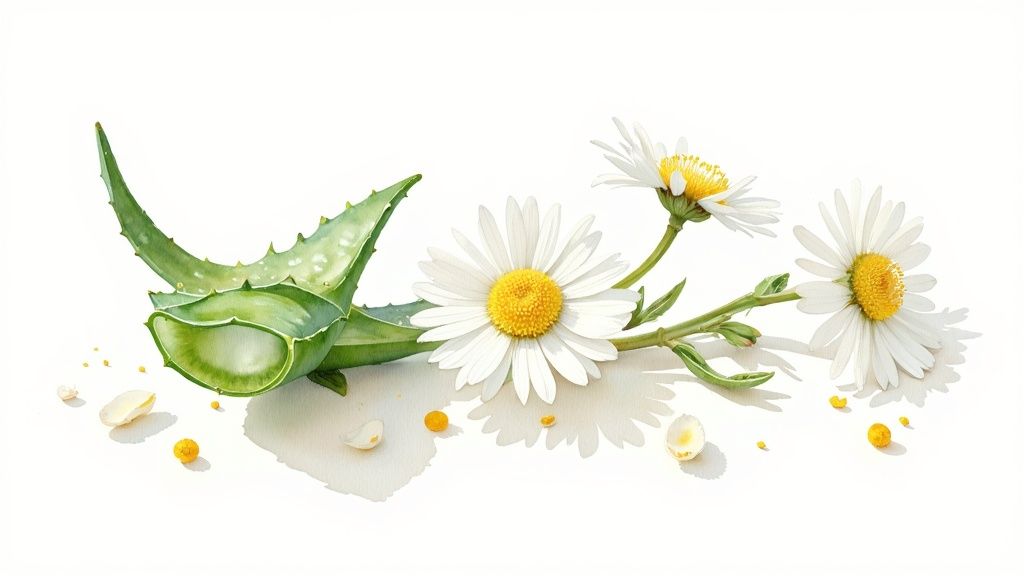
You'll find something for every budget and skin concern here, from reliable drugstore heroes to more specialized formulas. For each recommendation, I’ll break down exactly what’s in it, who it’s best for, and what makes it a standout pregnancy-safe acne face wash. Think of this as your trusted shopping list.
Best for Oily and Breakout-Prone Skin
When your skin feels like an oil slick by midday, you need a cleanser that can deep clean your pores without stripping away every last drop of moisture. Finding that balance is key to keeping breakouts at bay.
Recommendation: Belli Beauty Anti-Blemish Facial Wash
This cleanser was created from the ground up specifically for expecting mothers, which is why it’s such a staple. It relies on lactic acid, a gentle AHA, to whisk away the dead skin cells that clog pores and lead to new pimples.
- Key Safe Ingredients: Lactic Acid (AHA), Green Tea Extract, Cucumber Extract.
- Skin Type: Oily, Combination, and Acne-Prone.
- Why We Love It: It’s one of the very few face washes designed with pregnancy as its sole focus. The antioxidant-rich green tea and cucumber extracts also help calm down the redness and inflammation that often come with pregnancy acne.
Best for Sensitive and Irritated Skin
Pregnancy can throw your skin for a loop, making it suddenly react to products it used to love. If your face is feeling red, tight, or just plain angry, you need to go back to basics with a formula that is as gentle as possible.
Recommendation: Vanicream Gentle Facial Cleanser
There’s a reason dermatologists recommend Vanicream over and over: its formula is incredibly simple and non-irritating. It's free of pretty much every common trigger—dyes, fragrances, parabens, sulfates—making it a safe haven for highly reactive skin.
- Key Safe Ingredients: Purified Water, Glycerin.
- Skin Type: Sensitive, Dry, and Allergy-Prone.
- Why We Love It: This is the ultimate "do no harm" cleanser. It has one job—to clean your skin—and it does it perfectly without causing any drama.
The demand for clean, safe skincare isn't just a trend; it's a massive shift in the beauty industry. The global market for pregnancy-safe skincare was valued at roughly USD 3.9 billion in 2022 and is expected to climb to USD 5.4 billion by 2030. You can explore more data on the pregnancy-safe skincare market on sites.google.com.
Best for Combination Skin
Ah, combination skin—the classic battle of an oily T-zone and dry cheeks. You need a clever cleanser that can sop up excess oil where you don't want it, without leaving the rest of your face feeling parched.
Recommendation: CeraVe Foaming Facial Cleanser
This is a cult classic for a reason. It masterfully balances clarifying and hydrating ingredients, using hyaluronic acid to draw in moisture, niacinamide to calm redness, and ceramides to reinforce your skin's protective barrier. The gentle foam lifts away oil without making your skin feel tight.
- Key Safe Ingredients: Niacinamide, Hyaluronic Acid, Ceramides.
- Skin Type: Normal to Oily, Combination.
- Why We Love It: It strikes the perfect balance for tricky skin. Plus, the niacinamide is a fantastic ingredient for soothing the red, inflammatory bumps common in pregnancy acne.
Best Brightening Face Wash for Dull Skin
Sometimes, hormonal shifts can leave your skin looking a little flat and tired. A gentle exfoliating cleanser can work wonders, helping to buff away dullness and bring back that healthy pregnancy glow.
Recommendation: Glytone Mild Gel Cleanser
This gel wash uses a low, pregnancy-safe concentration of glycolic acid to provide effective exfoliation without being harsh. It helps clear out pores, refine skin texture, and can even help fade those pesky post-acne marks over time.
- Key Safe Ingredients: Glycolic Acid (AHA).
- Skin Type: Normal, Combination, and Oily.
- Why We Love It: It delivers real, visible exfoliating results. It’s a great choice if you feel your current routine is a bit too basic and you want something with a little more power.
Best Drugstore Find
Great skincare doesn't have to break the bank. You can absolutely find a safe, effective, and reliable face wash right in the aisle of your local pharmacy.
Recommendation: Cetaphil Daily Facial Cleanser
This one is a timeless favorite for a reason. It’s known for being incredibly mild and non-stripping, yet it still removes makeup, dirt, and excess oil with ease. It's a no-fuss, no-frills option that you can always count on.
- Key Safe Ingredients: Glycerin, Niacinamide.
- Skin Type: Normal to Oily, Sensitive.
- Why We Love It: It's affordable, easy to find everywhere, and trusted by skin experts and families for decades. It’s a solid, dependable workhorse for any pregnancy skincare routine.
Answering Your Top Pregnancy Acne Questions
Even after you've done your research, it’s natural to have a few lingering questions. Let's tackle some of the most common ones that pop up when you're navigating skincare during pregnancy. I want you to feel completely confident and at ease with your choices.
Think of this as our final chat to make sure you're feeling empowered on your journey to clear, healthy skin during this amazing time.
Is a Low-Percentage Salicylic Acid Wash Really Safe?
This is easily one of the most common questions I hear, and for good reason. While you absolutely need to steer clear of high-concentration salicylic acid peels, the general consensus among dermatologists and OB-GYNs is that a face wash with a low percentage (under 2%) is typically fine.
The logic behind this is that with a rinse-off product, very little of the active ingredient is actually absorbed into your bloodstream. That said, every single pregnancy is different. The gold standard is to always run it by your doctor before you start using it. A quick call or email is all it takes to get that final green light and complete peace of mind.
When Will My Skin Go Back to Normal After Birth?
Ah, the million-dollar question! For many women, that hormonal tidal wave starts to recede in the weeks and months after delivery. As your hormones find their new normal, your skin's oil production usually follows, which often means your acne starts to clear up naturally.
But there's no magic timeline here. Some see their skin improve within a few weeks, while others—especially those who are breastfeeding—might find that hormonal shifts continue to trigger breakouts. The key is to be patient and kind to your body as it recalibrates.
The postpartum period is a whole new journey for your skin. Sticking with your gentle, pregnancy-safe routine is a fantastic strategy until your hormones have had a chance to fully settle.
Are DIY Skincare Remedies a Good Idea Right Now?
Whipping up a treatment in your kitchen can feel like the ultimate safe and natural option, but this is an area where you want to tread carefully. Simple things like a calming oatmeal mask or a plain yogurt application are generally harmless and can feel great.
The trouble starts with more potent ingredients. DIY recipes using things like undiluted essential oils or straight lemon juice can be incredibly irritating, especially now. Your skin is much more sensitive during pregnancy, so a concoction that was fine before might cause a major reaction today. It's almost always safer to stick with professionally formulated products that are tested for stability and safety—especially when a great pregnancy safe acne face wash can do the heavy lifting for you.
When Should I See a Dermatologist?
If you’ve switched to safe products and are using them consistently but your acne is still severe, painful, or just really affecting your confidence, it's absolutely time to call in a professional. You don't have to just suffer through it.
A dermatologist can assess what's going on and may prescribe pregnancy-safe topical treatments like azelaic acid or clindamycin, which are more powerful than anything you can buy over the counter. They can also confirm that what you're dealing with is actually acne and not another skin condition. While a good face wash is your first line of defense, you might also be curious about in-office options. For example, you can learn more about professional acne treatments like Hydrafacial and discuss with an expert if a modified version could be right for you.
At Olive Skin Therapy, we're passionate about providing personalized, safe, and effective skincare for every stage of life—especially pregnancy. If you're looking for expert guidance and treatments tailored to your unique needs, we invite you to book a consultation. Let us help you achieve glowing, clear skin with total confidence. https://oliveskintherapy.com
